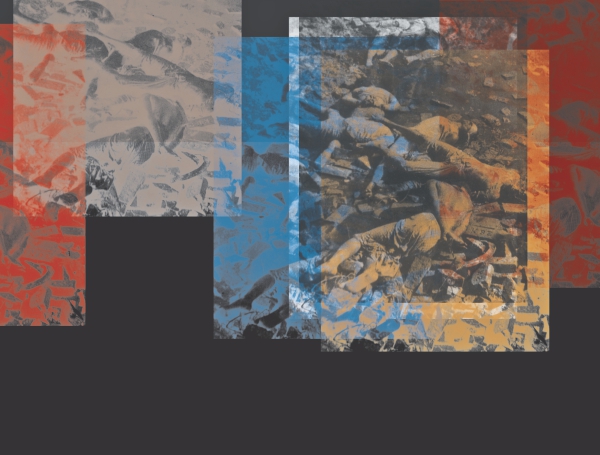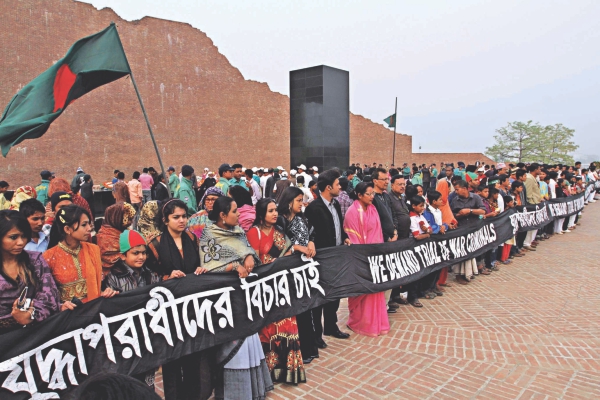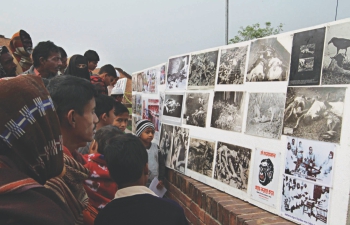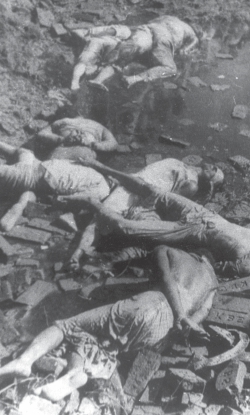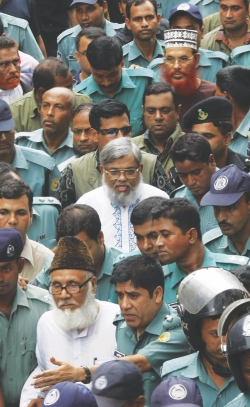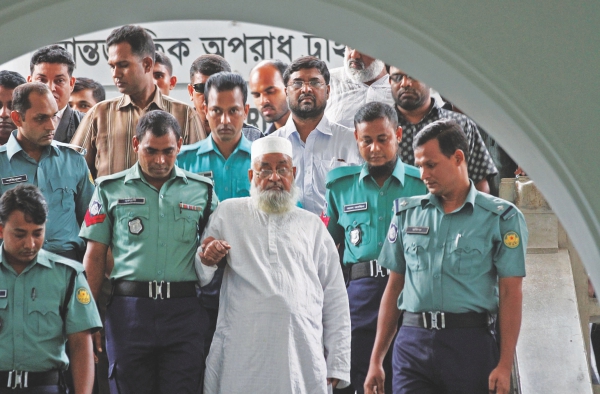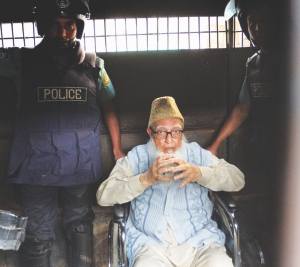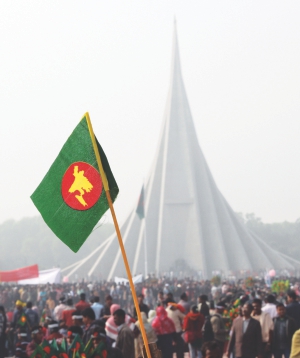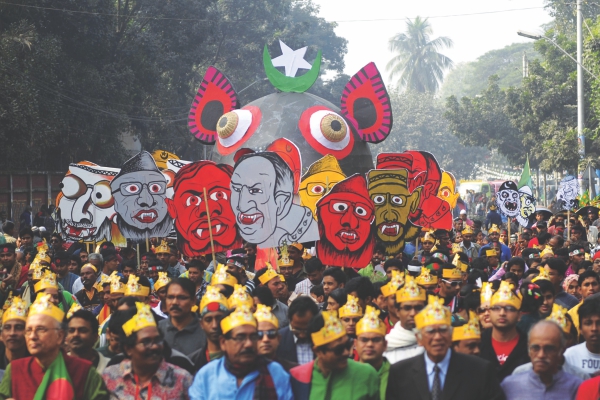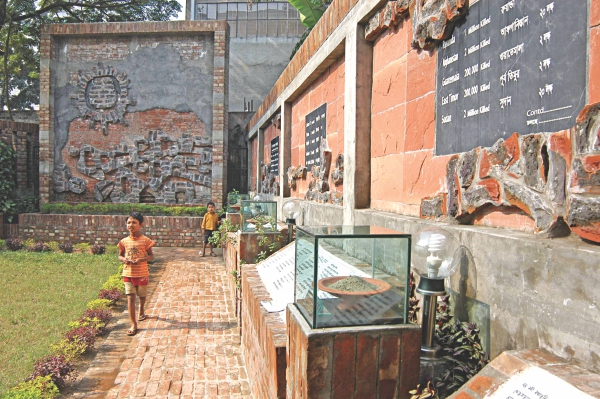| Home - Back Issues - The Team - Contact Us |
 |
| Volume 11 |Issue 49| December 14, 2012 | |
|
|
Cover Story
THE WAR CRIMES TRIBUNAL CONFINED IN POLITICAL SHACKLES The process began 39 years later on March 25, 2010 — the tribunal that promised justice to the millions who sacrificed their lives for the birth of Bangladesh and to the loved ones they left behind. This justice was not the demand of the dead but of the living, for whom the wounds are far from being healed. But recent events and deficiencies have blemished the process through which the trials are being conducted. Tamanna Khan The story of the birth of Bangladesh could have been different if two equally powerful nations had fought each other. In Bangladesh's case it was a people's war fought against an organised army, an occupying force that unleashed a killing spree throughout the 147,570 square kilometres of the country during the nine months of 1971. It was a systematic, planned massacre committed by the Pakistani Army and their associates on unarmed Bengali civilians, which according to the Geneva Convention 1949 is tantamount to war crimes, crimes against humanity and genocide.
The Pakistani army was joined by a quarter in East Pakistan, who did not hesitate to kill their fellow country men, rape their women, burn their houses and make millions homeless. History remembers them as the notorious Razakars, Al-Badr and Al-Shams. Historical documents show that most of the members of these allied forces belonged to the right wing parties of the then East Pakistan — Jamaat-e-Islami, Nejame-Islami and Muslim League, which ideologically opposed the existence of Bangladesh. From the very beginning, the war crimes tribunal has been facing constant challenges from opposing parties, especially Jamaat-e-Islami as most of their top brass are under trial in this tribunal. Besides fighting legal battles, they are carrying out street agitations, calling hartals, vandalising cars, setting fire, attacking law enforcement officers — demanding release of their leaders who are being tried for crimes against humanity and genocide. Historian Professor Muntasir Mamum is not surprised at Jamaat's reaction. He says, “War criminals are there both in Jamaat and Bangladesh Nationalist Party (BNP) and there are more in Jamaat as the party itself committed war crimes. It is only normal that Jamaat will not want this trial and BNP wants to support them because they are in an alliance. Plus both these parties support the mentality and ideology of the war criminals of 1971.”
BNP acting Secretary General Mirza Fakhrul Islam Alamgir however says, “We are not against the trial of the criminals of war crimes. Those who committed crimes against humanity, they must be tried. But the trial has to be impartial, fair, transparent and without any political bias or politically motivated. So that there is no question regarding the trial in future.” He says “We have said that the formation of tribunal was not proper. The way different newspapers are publishing the activities of the tribunal; I do not know if those are true or not, but if these are true then there is a question regarding the transparency of the trial.” In reply to whether BNP will allow continuation of this tribunal if voted to power, he says, “When we will form our election manifesto, we will have in-depth discussion about all this and then decide.” Speaking on behalf of Jatiya Party, presidium member Ziauddin Ahmed Bablu says, “Our party position is that we are in favour of the trial of the people who have committed this sort of inhuman activity and crimes against humanity.” He hopes that this process will continue "as this is not only our demand it is the demand of history. It should have been done much before.” Bablu adds, “We feel that there should not be any politics regarding the trial of the war criminals. It should be a national issue. Those who do not believe in our existence, those who fought against the liberation and sovereignty of Bangladesh, committed genocide, murder, rape and arson they must be tried. And all political parties that believe in independence, sovereignty and the ideals of the Liberation War should come to a consensus regarding this.”
Regarding the political aspect of the trial, Dr Imtiaz Ahmed, professor of International Relations, University of Dhaka advises government not to merge this tribunal with all other political issues. “The decision regarding the process of the upcoming election has not been solved yet. The largest opposition party, civil society and other stake holders feel that this issue has not been addressed. Even international community is also stressing the need for the participation of all parties (in the election).” He says that if the campaign regarding this unsolved issue is always connected to 1971, then the achievement of 1971 is diminished. Dr Ahmed explains, "1971 is a big thing and it should be kept separate from other political issues. Once the process of the upcoming democratic election is quickly resolved, this trial on 1971 can go on separately and then Jamaat and others, who are opposing this, will not be able to do so.” He feels that because of government's perception of political campaigns, especially those by the largest opposition party, as a conspiracy to stop the tribunal, Jamaat-e-Islami is getting benefited. “Whenever there is an agitation or someone brings up the matter of the election, those people are labelled as anti-liberation force. This blending of all hartals and other campaigns reduces the importance of 1971, while at the same time makes Jamaat stronger,” he warns. Dr Ahmed also calls to government to solve the recent controversy that has risen surrounding the skype conversations of Tribunal-1 chairman Md Nizamul Huq, published in a local media. The Skype conversation between the tribunal chief Justice Md Nizamul Huq and international criminal law expert Dr Ahmed Ziauddin published by a Bengali Daily created widespread criticism regarding the professionalism of the tribunal judge. The conversation was apparently been given to the UK based weekly The Economist by an unknown source. He says, “Government should solve this matter as quickly as possible without dragging it." In fact following the controversy Justice Md Nizamul Huq has resigned as the chairman of ICT-1 on December 11. Dr Ahmed feels, “Since the trial has come so far after so long and has a political aspect to it, so at this moment those who engage in this kind of conversation or attitude that does not fall within the rules, should step aside.” “Then the legal process will continue in its own pace,” he concludes.
Meanwhile Jamaat is not only opposing the trial process through political programmes but fighting the legal battle with equal intensity. Under the circumstances, one area which has not been given enough attention appears to be the protection of victims and witnesses. There is no separate witness protection law in Bangladesh but provisions are there under the ICT Act 1973. In prosecution lawyer Rana Dasgupta's opinion because of the absence of a specific law to deal with witness and victim protection, we are not being able to use the current rule effectively. Dasgupta opines that a separate authority should have taken up the task of ensuring protection to the witness, not the thanas which are already burdened with other tasks. Mofidul Hoque, trustee, Liberation War Museum also feels the same. “It is a fundamental flaw of our trial. In any international tribunal, the victim's right is a very important component.” Giving example of the Cambodian court he says, “They have a separate gallery for the victim's family and there are outreach programmes on behalf of the tribunal to inform the society. It is important to know how other tribunals are upholding victims' rights.” Hoque also thinks that the national media could have played a greater role in documentation and collecting narratives of other cases which did not appear in the tribunal. Regarding media's responsibility, journalist Zahid Reza Noor, says, “What media could have done is analyse the incidents that took place in 1971 not only through reporting…. Media should portray what is meant by genocide, if it took place here, the effect of that genocide, and the vacuum it created in our country. All these should be brought to light again and again, by both print and electronic media.” While international community calls for the transparency and credibility of the tribunal, Dr Shahdeen Malik feels that their concern is not an obligation for us. “Ours is the only war crimes trial which has been started and going on by national judges, by national lawyers in a national institution, meaning tribunal according to a national law. All other past war crimes trials that took place in other countries, because of the very strong and powerful position of the accused, no country dared to put them on trial on their own,” he says citing the Cambodian trial against the Khmer Rouge regime. “We are conducting this trial without their help,” he says. “If we had engaged a couple of foreign lawyers from a foreign country, one judge from a white Christian country, would there be any criticism?” Malik asks. Prof Muntasir Mamum picks up the argument here saying that the pressure from government regarding quick completion of the trial actually comes from the people. “It is not only the ministers who are asking for quick completion of the trial, we are saying this too. We are not part of government. People want to hear judgement.” He gives example of the Nuremberg trial where in 10 months trial of 22 war criminals were completed. “If they cannot complete the trial of even one person in two years then they are not being able to do this properly. We can demand why a verdict will not be announced quickly,” he says.
Despite all the hurdles people who want justice for the crimes against humanity and genocide of '71 are optimistic about the ultimate result of the trials. The prompt resignation of the Justice Md Nizamul Huq suggests that there is a conscious effort to remove controversy from the proceedings and the tribunal itself. Noor, son of martyred journalist Sirajuddin Hossain is well aware of all the different challenges that the trial is facing, yet he is hopeful. Jamaat Secretary General Ali Ahsan Mohammad Mojahid has been charged with the murder of his father. Waiting for justice for the last 41 years, he says, “May be we are walking forward with difficulty but I believe that the current generation will gear up the pace. They want punishment of the war criminals.” And he believes that the trial will continue.
THE LEGAL BATTLE It has always been difficult to try the war criminals — both the principal and the associates. International pressure and a lack of consensus among political parties regarding the trial had always stood in the way for justice. The first attempt to try the war criminals was taken in January 1972, under the 'Collaborators Act, 1972'. However, the 'Collaborators Act' had limitations; for instance, the members of the occupying forces committing war crimes in Bangladesh could not be tried. Besides, it followed the normal proceeding of the criminal court, whereas there was no scope to try people for 'genocide', 'war crimes', 'crimes against humanity' and 'crimes against peace'. Thus the International Crimes (Tribunals) Act, 1973 was enacted. However, before this new law could be put to use, the architect of our Liberation War, Bangabandhu Sheikh Mujibur Rahman was brutally murdered along with his family on August 15, 1975. The governments that followed pushed both the law and people's demand for justice into oblivion. It was not until the second term of the Awami League government led by Sheikh Hasina that the trial of the war criminals could begin. A three member judges' panel was formed with Justice Md Nizamul Huq Nasim as the chair, Justice ATM Fazle Kabir and retired District Judge A K M Zaheer Ahmed as the other members of the panel. An Investigation Agency with former Inspector General of Police (IGP) Abdul Hannan Khan as the coordinator was formed with five investigation officers and 14 officers. Senior lawyer Ghulam Arieff Tipoo led the 12 member prosecution panel. The old High Court building was renovated to hold the tribunal. Two years later the trial of nine alleged war criminals are in full swing at the two war tribunals. The second war tribunal was formed on March 22, 2012 with Justice ATM Fazle Kabir as its chairman and High Court judge Obaidul Hassan and district judge M Shahinur Islam, also registrar of the first tribunal, as the other members. Justice Anwar-ul Haque, an HC judge, has replaced Justice Kabir as member of the first tribunal headed by Justice Md Nizamul Huq (who resigned on December 11, 2012). Later this year, Justice Jahangir Hossain Selim was appointed as the third member of Tribunal -1 after the resignation of former District Judge A K M Zaheer Ahmed. At present, Registrar AKM Nasiruddin Mahmud runs the administration of the tribunal along with a deputy and assistant registrar. Twelve new members have been appointed in the prosecution panel and senior members of the panel have been promoted to Additional Attorney General level from Deputy Attorney General. Prosecutor Mohammad Ali provides an overview of the ongoing proceedings of the two tribunals. He explains the nine stages involved in the trial. “From the submission of the formal charge the proceedings start. Then hearing both sides cognizance of the offence is taken up,” he says adding that in the third stage charges are framed upon the materials and evidence placed in court by the prosecution. In the fourth stage, he says, the matter is fixed up for opening statement. “Thereafter the tribunal shall start examining the prosecution witnesses. After completion of the testimony of the prosecution witnesses, the defence will adduce defence witnesses,” he continues. Once defence witnesses' testimonies are complete, the stage for the closing arguments which in this tribunal is referred to as summation of the case is started. After both prosecution and defence have summarised their cases, the day for delivery of judgement is fixed. “If the accused is convicted, then the accused has the right to appeal in the Appellate division of the Honourable Supreme Court within 30 days from the pronouncement of judgement.” Delawar Hossain Sayedee's case, the first to go into trial on November 20, 2011 concluded last week on December 6, 2012 and is awaiting verdict till the time of writing this article (December 11, 2012). Sayedee is facing 19 charges of crimes against humanity at the tribunal. Besides Sayedee, trial of former ameer of Jamaat-e-Islami Ghulam Azam, Jamaat-e-Islami chief Motiur Rahman Nizami and BNP's Salauddin Quader Chowdhury are under way at Tribunal-1. Fourteen prosecution witnesses have testified against Ghulam Azam and currently first defence witness Azam's son Brig Gen (dismissed) Abdullahil Aman Azmi is giving his testimony. Motiur Rahman Nizami and Salauddin Quader Chowdhury's cases are at the fifth stage, which deals with examination of prosecution witnesses. At Tribunal-2, testimony of defence witnesses has been completed in Jamaat leader Abdul Quader Mollah's case and summation of the case is scheduled to begin on December 12. Twelve prosecution witnesses including two investigation officers have given their testimony in this case. The trial of Jamaat Leader Mohammad Kamaruzzaman, General Secretary Ali Ahsan Mohammad Mojahid and former BNP lawmaker Abdul Alim is at the fifth stage meaning prosecution witnesses are giving their testimonies. Fourteen prosecution witnesses of expelled Jamaat member Abul Kalam Azad alais Bachchu Razakar have given their testimony. Azad's is the first case that a trial in absentia is taking place in the international crimes tribunals of Bangladesh. He went into hiding around seven hours before Tribunal-2 issued an arrest warrant against him on April 3, 2012. On October 7, the tribunal decided to hold Azad's trial in his absence since he failed to appear before the tribunal even after court summoned him through newspaper advertisement. Though the court appointed a state defence counsel to defend Azad, because of his family's non-cooperation, the defence counsel could not yet submit a list of defence witness for this case. While these nine trials are being held at the tribunal investigation on Jamaat-e-Islami Nayeb-e-Ameer Maulana Abdus Subhan, its acting secretary general ATM Azharul Islam, Central Executive Committee member Mir Quashem Ali, Jamaat leader Moulana AKM Yusuf, former Jamaat leader Maulana Shakhawat Hossain and Faridpur BNP leader MA Zahid Hossain Khokon alias Khokon Razakar are being carried out. Formal charges will be brought against Chowdhury Mueen-Uddin, who currently resides in the UK and is a Muslim community leader there. Mueen-Uddin is allegedly known as the "operation in charge" of the killings of intellectuals during the Liberation. The same will be done for Ashrafuzzaman Khan who is known to co-lead the Al-Badr operation in 1971. He is now a US citizen. |
||||||||||||||||||||
Copyright
(R) thedailystar.net 2012 |
